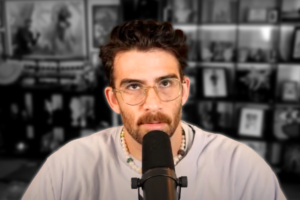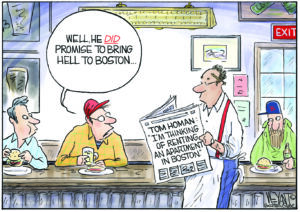If Everyone Has Trauma, Everyone Has Trauma
The ubiquity of suffering does not make it less real, but in and of itself, it doesn’t make you special, either. (Image: Adobe)
(Image: Adobe)
The following story is co-published with Freddie deBoer’s Substack.
This weekend I read Jamie Hood’s new book “Trauma Plot: A Life.” The book combines memoir and literary criticism, using real, horrific experiences to examine how we should think about the deployment of such experiences in our narrative art and criticism. I struggle to define exactly how I feel about it, as a book, because it’s so openly meta-discursive — that is to say, it’s a book written to be in conversation with the culture, in part by being about the conversation. The book details Hood’s multiple sexual assaults and the trauma she experienced as a result of them. That core memoiristic part of the book is, to me, strangely low-energy, pro forma. (It doesn’t help, really, that she is opposed to a “carceral” response to her assailants and generally fatalistic about any positive outcome stemming from what she experienced.) No, the energy in the book lies in its understandable, wounded resentment that the literary world has perhaps turned on the trauma plot. Hood has produced a book about her trauma at a time when, she seems to think, the reception for such a book has grown chilly, and that tension ultimately is the core of “Trauma Plot: A Life.”
The trauma plot, if you’re unaware, is a term that refers to a kind of narrative that’s become inescapable in novels, movies and (especially) television: a character is portrayed with various unfortunate personality characteristics and behaviors, whether they hurt the character or the people around them or both, and over time it’s revealed that these problems are ultimately the product of specific, discrete and digestible traumatic events in their past. “Fleabag” is an archetypal example: the titular character is charming, self-hating and frequently functionally sociopathic toward the people around her; at the end of the first season it’s revealed (uh, spoilers) that she was the woman who had cheated with her best friend’s partner, prompting her best friend’s suicide. In the trauma plot, the revelation of the traumatic event is the prestige, the grand unveiling. The connection between the past trauma and the future personality is usually assumed to be implicit and obvious, so that the audience can’t help but understand why the former led to the latter.
I don’t think human beings actually work this way, but in fairness, ascribing adult personality traits to very specific past events is a dynamic that’s far larger than the trauma plot; indeed, a huge number of contemporary “realist” novels operate from this logic.
There’s a lot of discourse that’s gone down about the omnipresence of trauma in contemporary society, much of it critical, though truth be told, I don’t think that resistance has slowed down the trauma plot industrial complex at all. Most prominent, and a piece that deeply influenced Hood’s book, is “The Case Against the Trauma Plot” by the critic Parul Sehgal. Published in the New Yorker in 2021, the essay makes a convincing case that the reliance on trauma as an all-encompassing motive for human behavior has resulted in narrative art that’s sclerotic, narrow and overly determined.
“Trauma came to be accepted as a totalizing identity,” writes Sehgal, and this in and of itself is a matter of concern for the novel, a medium which has tended to work best when it avoids pat answers and diagrammatic, one-to-one correspondences between past events and present behaviors. There’s also the little complication that trauma was until recently an actual medical concept and that the dynamics of that concept are not always convenient for dramatic purposes. “[The trauma plot’s] status has been little affected by the robust debates within trauma theory or, for that matter, by critics who argue that the evidence of [Bessel] van der Kolk’s theory of traumatic memory remains weak, and his claims uncorroborated by empirical studies,” writes Sehgal. You’d prefer it if novels didn’t have to correspond to ever-changing scientific developments, right, but that’s what you invite when you choose to forego words like “pain” and instead embrace “trauma.”
Specialness cannot survive being universalized.
While I didn’t love Hood’s book, I can say that there’s a very appealing vulnerability in what it’s attempting. The book is aware (perhaps too aware) of the slightly diminished public reputation of the trauma plot and recent criticism of its failings, however quiet that criticism may be in contrast with the device’s prevalence. Hood is writing a book that functions primarily as a justification of itself; I know that sounds tiresome, and it frequently is. But I do appreciate Hood for just laying that out there, for being unfussy and direct about the anxieties that influence her, and there’s something very 21st-century about embedding your reaction to the assumed reception of your book in the book itself.
Whatever the reality, we’re left in the same place we were 3 1/2 years ago when Sehgal’s essay was published: everybody wants to talk about their trauma, but there’s a potent sense of unease that attends this cultural development. Sehgal’s intervention is a fruitful exploration of the various artistic downsides inherent to leveraging trauma for narrative effect, but it’s a large genre. Today I’m less interested in aesthetics and more in the simple social dilemma presented by an era in which any stigma concerning the public excavation of trauma has evaporated. It’s simply a numbers game: to invoke trauma is an attempt to claim special status, but specialness cannot survive being universalized. In this, trauma is like very much else in modern digital culture.
So you have my complaints about how neurodevelopmental disorders like ADHD and autism function in modern elite culture. Despite what some people think, I’ve never suggested that ADHD and Level 1 autism don’t cause personal difficulties, much less that they’re not real. They’re very much real disorders and cause very real difficulties for those who have them. I have claimed that these disorders have become cultures in ways that are unhelpful, including for people who have them; I’ve also said that it’s straightforwardly true that skyrocketing diagnosis rates for both disorders are largely the product of factitious disorders, people who don’t really have them who embrace the disorders anyway as a means to gain various kinds of attention and sympathy. This opinion has not endeared me to many people in those communities, it’s fair to say. And yet there is also an undercurrent of discontent that filters back to me supportively from within autism and ADHD, occasionally, and for a simple reason: to claim to have a medical problem is to seek a special kind of attention, a special kind of help.
That’s not a critique; that’s exactly how it’s supposed to work. If you’re in a wheelchair and you physically cannot get into the post office because the build isn’t accessible, you invoke a special need and demand special accommodation, as well you fucking should. The trouble is that special demands can only remain special when they’re relatively rare. As I’ve said over and over again, society simply cannot provide reasonable accommodation if everyone starts seeking it. You can look at American public schools and the immense strain imposed by ever-growing numbers of students with special education claims for a sense of what I mean; with parents no longer constrained by stigma — indeed, many affluent parents now seem to seek special education status as a mark of honor — the system is buckling under the weight of accommodations that no one ever thought would become so common. (Who knew, in 1990, that having a child with autism would one day be on trend for chic urbanite parents?) And even if we’re talking less about formal legal accommodation like special education and more about the vaguer sort of accommodations that we apply socially, there appears to be a growing undercurrent of discomfort with so many people crowding the neurodevelopmental disorder space. That’s why some people who are generally predisposed to hate my opinions on disability grudgingly agree with some of what I say — they understand that a world where vast armies of the newly diagnosed claim their disorders is a world that can’t possibly treat those disorders as special.
Society simply cannot provide reasonable accommodation if everyone starts seeking it.
Which brings us back to trauma. I think a lot of people are growing discontented over the relentless ubiquity of trauma talk because they understand that trauma is supposed to be special. Fundamentally, at the bottom of all of it, to invoke your trauma rather than your pain or your unhappiness or your suffering or your struggle is to make the claim that what you’ve endured goes beyond human business as usual. It’s to ask the world to take your own suffering a little more seriously, to see it as something that transcends the ordinary. In modern life, we medicalize problems as a way to ensure that those problems are taken seriously. That’s why dubious illnesses like fibromyalgia and chronic Lyme have flourished, because as a society we have decided for some reason to treat mental exhaustion and physical discomfort as meaningful only when blessed by the medical establishment with formal recognition. Trauma is a notoriously capacious and vague concept, one into which all manner of human unhappiness can fall; that is, obviously, why it’s proven so popular, why it’s perceived to be so useful. Trauma is populist enough that everyone can claim it while still maintaining enough of a sheen of medical legitimacy to prompt various kinds of official sympathy. Deepening discomfort with its ubiquity does indeed reflect specific criticisms of the concept as a scientific medical term, yes. But it also reflects intuitive understanding that if everyone is holding their pain up as special in the same way, someday no one will see it as special any longer.
But, of course, it’s all real pain. I’m sure some will immediately suggest that I’m denying the pain that people live with, denying that there’s ample suffering out there, suggesting that everybody’s faking it. I don’t think that at all. I think instead that it’s all suffering and it’s all real; it’s just not special. I can’t remember where I wrote it, but I will repeat myself: There is nothing more ordinary, more quintessentially human, than to suffer. Suffering, indeed, is the heart of being human. The trouble lies in the effort to wring special treatment out of rendering your own suffering something more “valid,” something more scientific, than by attaching quasi-medical terminology like “trauma” onto it. That’s an understandable move, emotionally, but a destructive one, as it ultimately simply deepens the mistaken belief that suffering must be medicalized, made official, to be worthy of sympathy. In fact, medicalized suffering demands no more compassion than any other kind; the whole edifice of the medical space does not exist to provoke sympathy at all but rather to dictate certain specific best practices for solving medical problems. And here again you have the problem with everyone deciding to adopt the neurodevelopmental disorder du jour: in its transactional approach to demanding attention, that sort of sympathy-bootstrapping muddies the waters of medical care when medical care is of course the only response to medical problems that really matters.
Hood complains about critics of the trauma plot, in the book, writing that they act as though “there’s no reason to write about trauma except to make a buck.” That would certainly be an uncharitable thing to believe. But you invoke trauma rather than simple human pain for a reason, and that reason is always ultimately transactional. And that’s unnecessary. Though she surely was, Hood does not need to have been traumatized, in a medical sense, for me to feel compassion for and solidarity with her regarding her multiple rapes. More to the point, what her trauma cries out for is real treatment, therapy, medication if appropriate, medical care. As artists, we can turn trauma into good art, but of course we will succeed and fail on artistic terms, not on the terms of trauma itself. And as human beings we can seek support and sympathy for our traumas, but we should do so within our own circles of trust, our own personal networks of friends and family, asking for help not of the world writ large but of our people. Strangers never really feel sympathy about trauma, anyway. The social structures we’ve built that mandate a respectful response to claims of trauma, being artificial, ensure that those responses will be pro forma, mechanistic and unreal in turn.
Suffering is the most ordinary thing you can do.
Yes, I do of course have sympathy for people who actually have the very real medical disorders of autism and ADHD. More important than my sympathy, I want to accommodate those people in the way required by the Americans with Disabilities Act. But in order for that whole deal to function, there must be gatekeeping about who actually does and does not have a medical disorder. If you tear down the gates around the diagnosis and insist on special status for people who have the diagnosis, you’re creating a flatly unsustainable scenario. This is part of why autism is facing multiple competing schisms at once. Tensions over the dominance of the perspective of the least-afflicted within autism are already boiling over, tensions that are exacerbated by related questions of research funding and control over the future of the disorder. I am absolutely certain a civil war is brewing within the autism community, even totally separate from any of my own specific complaints. And it’s already long been the case that many people diagnosed with ADHD long ago express distrust and resentment toward the hordes of new converts, distrust and resentment that are stoked by ongoing problems with stimulant shortages. To say that you have a medical disorder is to make a claim for special status. If everyone feels empowered to make that claim, the status cannot remain special. None of this is complicated.
Look, go-getting WEIRD people always have a meta, and in 2025 the meta is to get attention from as many people as possible. Of course there are many people who pursue other virtues and alternative value systems that prize more durable goods. Of course the burning need for attention has consumed people for time immemorial. But I would contend that never before has the naked demand for the attention of strangers been more common, less stigmatized, more shameless. When I was a teenager, I grew up into a world where openly pandering for attention was seen as corny and pathetic, even though that opinion was held by people who all sought attention sometimes. As a teenager, I certainly panhandled for attention myself, but there was at least a communal understanding that to do so too nakedly was worthy of embarrassment. Now that sense of embarrassment is dead, stone dead. And we’re left with a very basic dilemma: on a planet of 8 billion people, we can’t all be special. We are all literally unique, and we can all be indispensable to our little bands of friends and family. But the ceaseless demand to be special to everyone just can’t be satisfied. If trauma can be rescued as a medical concept, it should be, and victims of trauma should be given all appropriate medical care. But this recent vogue for using trauma as a means to demand other people’s attention cuts directly against that medical mission.
We’re all suffering, and the ubiquity of that suffering does not make it any less real, intense or potentially ennobling. But suffering can’t make you special. Suffering is the most ordinary thing you can do. And, I’m sorry to say, there’s never been anything else to do than to get over it, or die trying.
Dig, Root, GrowThis year, we’re all on shaky ground, and the need for independent journalism has never been greater. A new administration is openly attacking free press — and the stakes couldn’t be higher.
Your support is more than a donation. It helps us dig deeper into hidden truths, root out corruption and misinformation, and grow an informed, resilient community.
Independent journalism like Truthdig doesn't just report the news — it helps cultivate a better future.
Your tax-deductible gift powers fearless reporting and uncompromising analysis. Together, we can protect democracy and expose the stories that must be told.
This spring, stand with our journalists.
Dig. Root. Grow. Cultivate a better future.
Donate today.








You need to be a supporter to comment.
There are currently no responses to this article.
Be the first to respond.